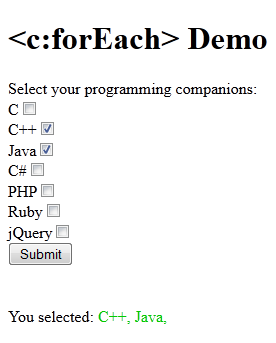JSTL Core Tag c:forEach Example
- Details
- Written by Nam Ha Minh
- Last Updated on 31 August 2019 | Print Email
JSTL <c:forEach> Syntax
<c:forEach
items="<object>"
begin="<int>"
end="<int>"
step="<int>"
var="<string>"
varStatus="<string>">
...
</c:forEach>
Name | Required | Type | Description |
items | False | java.lang.Object | Collection of items to iterate in the loop. |
begin | False | int | Begin index of the iteration. Iteration begins at the value mentioned in this attribute value. (if items specified) First item has index of 0. |
end | False | int | End index of the iteration. Iteration stops at the value mentioned in this attribute value (inclusive). (if items specified) . |
step | False | int | Iteration processes for the step value mentioned in this attribute. |
var | False | java.lang.String | Name of the scoped variable which holds the current item in the iteration. This variable’s type depends on the items in the iteration and has nested visibility. |
varStatus | False | java.lang.String | Name of the scoped variable which holds the loop status of the current iteration. This variable is of type javax.servlet.jsp.jstl.core.LoopTagStatus and has nested visibility. |
JSTL <c:forEach> Example:
The following JSP example iterates over the choices user selected and displays them.<%@ page language="java" contentType="text/html; charset=ISO-8859-1"
pageEncoding="ISO-8859-1"%>
<%@ taglib uri="http://java.sun.com/jsp/jstl/core" prefix="c" %>
<!DOCTYPE html PUBLIC "-//W3C//DTD HTML 4.01 Transitional//EN" "http://www.w3.org/TR/html4/loose.dtd">
<html>
<head>
<meta http-equiv="Content-Type" content="text/html; charset=ISO-8859-1">
<title><c:forEach> Demo</title>
</head>
<body>
<h1><c:forEach> Demo</h1>
<form name="forEachForm"
action="${pageContext.request.contextPath}/tag-types/core/for-each.jsp"
method="POST">
Select your programming companions: <br/>
C<input type="checkbox" name="langChoice" value="C"/><br/>
C++<input type="checkbox" name="langChoice" value="C++"/><br/>
Java<input type="checkbox" name="langChoice" value="Java"/><br/>
C#<input type="checkbox" name="langChoice" value="C#"/><br/>
PHP<input type="checkbox" name="langChoice" value="PHP"/><br/>
Ruby<input type="checkbox" name="langChoice" value="Ruby"/><br/>
jQuery<input type="checkbox" name="langChoice" value="jQuery"/><br/>
<input type="submit" value="Submit"/>
</form>
<br/>
<br/>
You selected:
<c:forEach var="lang" items="${paramValues.langChoice}">
<font color="#00CC00"><c:out value="${lang}"/>,</font>
</c:forEach>
</body>
</html>In the above example, we have few checkboxes to represent different programming choices. Upon user selection of these choices, we are iterating over the items user selected and displaying them using <c:forEach> tag.
Examples to demonstrate <c:forEach> attribute usage:
<c:forEach items="${countries}" var="country">
<p>${country}</p>
<c:forEach>In the above example we are displaying countries. Since it’s a simple type (String in this case) we can simply display its value. To display values from a list of POJOs, we iterate through the list and access each object’s property in order to display its value. The following example demonstrates this:<c:forEach items="${studentList}" var="student">
<p>${student.firstName}</p><br/>
<p>${student.lastName}</p><br/>
<p>${student.grade}</p><br/>
<p>${student.dateOfBirth}</p><br/>
</c:forEach>In the above example, we iterate over collection of student objects and displayed student properties. The attribute ‘var’ holds each object from the current iteration. Every time the variable defined in ‘var’ attribute will have a new object throughout the iteration.
In the some cases, we need to start iteration at a specified index or we may need to stop iterative at certain point. Also, we may need to iterate every alternate item in the collection. To deal with this kind of special cases <c:forEach> has additional attributes:
<c:forEach items="${schools}" var="school" begin="4">
School from index 4: ${school}
</c:forEach>The above example displays school names from index 4 that means, from item 5 since index begins at 0. EndIteration ends at the specified index. The index is inclusive.<c:forEach items="${schools}" var="school" begin="4" end="8">
School from index 4 until index 8: ${school}
</c:forEach>The above example displays school names from index 4 that means, from item 5 since index begins at 0 until index 8. If the collection contains items more than 8, rest of the items will be ignored displaying only until index 8. StepTo iterate over step items in the collection stating with the first item.<c:forEach items="${schools}" var="school" step="2">
Every alternate school: ${school}
</c:forEach>Above example displays every alternate school in the collection (i.e., 1,3,5,7 and so on). varStatusvarStatus attribute essentially holds loop status object. We can do number of things with this attribute. One example is, if we want to do special things for last item in the collection we can use varStatus to access last item as shown in the below example:<c:forEach items="${schools}" var="school" varStatus="status">
School from index 4 until index 8: ${school}
${not status.last ? ‘<hr/>’ : ‘<br/>’}
</c:forEach>In the above example we are displaying school names with horizontal line for each school name. We avoided horizontal line for the last school name instead we had given a line break for the last item.The variable given in the varStatus attribute is of type javax.servlet.jsp.jstl.core.LoopTagStatus.Output:
 The selected choices are displaying using <c:forEach> tag.
The selected choices are displaying using <c:forEach> tag. Recommended Usage of JSTL <c:forEach> tag:
The <c:forEach> tag is useful to iterate over collections and to display their values. We can use attributes like begin, end, and step to perform iterations which start at a particular index or end at particular index or to step over items respectively. Using varStatus attribute which holds loop status, we can perform loop operations like checking whether the current iteration is the last iteration etc.
Other JSTL Core Tags:
catch | if | choose | forTokens | import | out | param | redirect | remove | set | url
About the Author:
 Nam Ha Minh is certified Java programmer (SCJP and SCWCD). He began programming with Java back in the days of Java 1.4 and has been passionate about it ever since. You can connect with him on Facebook and watch his Java videos on YouTube.
Nam Ha Minh is certified Java programmer (SCJP and SCWCD). He began programming with Java back in the days of Java 1.4 and has been passionate about it ever since. You can connect with him on Facebook and watch his Java videos on YouTube.
Comments
I can not find an example.
this is second in list
Numero de boletos
Gracias.
For iteration of json obejct ...first u have to convert json boject into Collection and than after u can iterate it.